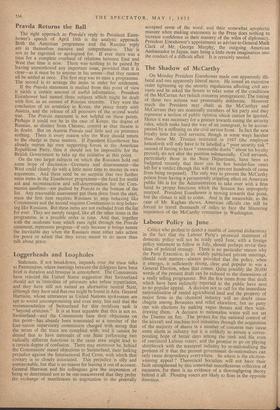Pravda Returns the Ball
The right approach to Pravda's reply to President Eisen- hower's speech of April 16th is the analytic approach. Both the American programme and the Russian reply are in themselves massive and comprehensive. This is not to be regretted or apologised for. If ever there was a time for a complete overhaul of relations between East and West that time is now. There was nothing to be gained by leaving unmentioned any important issue, provided that it is clear—as it must be to anyone in his senses—that they cannot all be settled at once. The first step was to state a programme. The second is to arrange *the items in order for settlement.
If the Pravda statement is studied from this point of view it yields a certain amount of useful information. President Eisenhower had named three subjects which might be dealt with first, as an earnest of Russian sincerity. They were the conclusion of an armistice in Korea, the peace treaty with Austria, and the release of all prisoners of the second world war. The Pravda statement is not helpful on these points. Perhaps it could not be in the case of Korea; the degree of Russian, as distinct from Chinese, control in that theatre is in doubt. But on Austria Pravda said little and on prisoners nothing. There is every reason why the West should return to the charge in these matters. If President Eisenhower has already outrun his own supporting forces in the American Republican Party, then it should not be impossible for the British Government to take up the initiative at this point.
On the two larger subjects on which the Russians hold out some hope of discussion—Germany and disarmament—the West could clearly do with a little more time to muster its own arguments. And there need be no surprise that two further main items in the Eisenhower programme—the fund for world aid and reconstruction and self-determination for the Com- munist satellites—are pushed by Pravda to the bottom of the list. Any reasonable assessment put them there from the start, since the first item requires Russians to stop behaving like Communists and the second requires Communists to stop behav- ing like Russians. But these items are not excluded from the list for ever. They are merely ranged, like all the other items in the programme, in a possible order in time. And that, together with the moderate tone which • runs right through the Pravda statement, represents progress—if only because it brings nearer the inevitable day when the Russians must either take action for peace or admit that they never meant to do more than talk about peace.


































 Previous page
Previous page